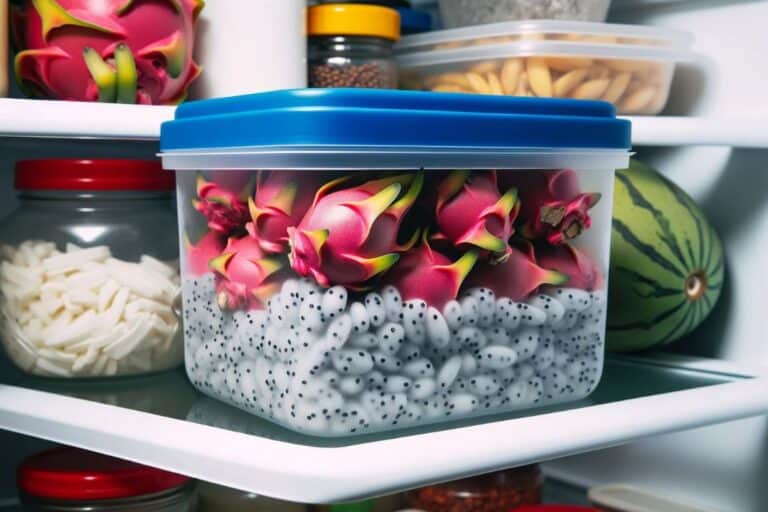Can You Freeze Cooked Liver: How Long Does It Last
Freezing cooked liver is a topic that many culinary enthusiasts and health-conscious individuals ponder. The liver, often considered nutrient-rich, is a popular food item in various cuisines worldwide. So, can you freeze cooked liver?
Whether it’s chicken, pork, beef, or lamb, the liver is a nutrient-dense organ meat that offers a plethora of essential nutrients, including B vitamins. It’s a good source of protein and is often considered a very healthy pet food, especially for a large dog.
If you’ve been to the grocery store and picked up some fresh chicken livers or pork liver, you might wonder how to store and preserve its taste and nutrients.
The refrigerator storage of meats usually offers a shelf life of raw beef liver for about 1-2 days. But what if you’re not planning to cook or consume it within that short time?
This is where freezing comes into play. The freezing process is a great way to extend the shelf life of this nutrient-rich variety of meat. The liver freezes well and can be stored for 3-4 months.
However, cooking and preparation before freezing are essential to ensure the best quality post-freezing.
One of the main ways to ensure your liver retains its original texture and taste after freezing is to remove excess moisture and liquid. After cooking the liver slices on medium heat, lay them on a baking sheet lined with paper towels.
This will absorb much of the excess liquid. After a few minutes, wrap the liver in freezer paper or place it in a Ziploc bag. Another good option is an airtight, heavy-duty aluminum foil or freezer bag.
Proper Storage: Airtight Containers and Labeling
Storing cooked chicken livers and beef in airtight containers is essential to prevent freezer burn and maintain their freshness. When air is exposed, frozen chicken and beef can develop ice crystals, affecting the livers’ taste and texture.
You can freeze beef and chicken livers using airtight containers to create a barrier that protects them from these unwanted effects.
Labeling your containers with the date is another crucial step in proper storage, especially when freezing leftover chicken and beef liver. Freezing cooked livers, beef, and chicken extends their shelf life, but keeping track of how long they have been frozen is still essential.
Labeling the meat and chicken containers allows you to quickly identify when the livers were freeze-stored and frozen and ensure they are consumed within a safe timeframe.
When selecting airtight containers for storing cooked beef and chicken livers, opt for ones specifically designed for freezer use. Freezer-safe bags or containers provide optimal storage conditions for meat and chicken by preventing air from entering and preserving the quality of the liver.
These specialized packaging options are designed to withstand freezing temperatures and are perfect for freeze-drying beef liver and maintaining the quality of leftover chicken liver.
Proper storage techniques play a significant role in preserving the taste and the texture of frozen cooked chicken liver. When stored correctly, beef and chicken liver maintain tenderness and juiciness even after thawing. Here are some additional tips to ensure your cooked chicken liver stays at its best.
- Store your cooked chicken liver in an airtight container or freezer bag before placing it in the refrigerator or freezer.
- If using ziplock bags, remove as much air as possible before sealing them tightly. This is especially important when storing chicken and beef liver. This is especially important when holding chicken and beef liver.
- Liquids such as chicken liver gravy or beef liver sauce should be placed in separate containers to avoid potential leakage.
- Ensure that your fridge or freezer maintains safe temperatures (below 40°F/4°C for refrigerators) for beef liver and chicken liver, and 0°F/-18°C for freezers.
- Avoid storing cooked liver at room temperature for extended periods, as this increases the risk of bacterial growth.
By following these guidelines, you can extend the lifespan of your cooked liver while preserving its quality. Proper storage prevents food waste and allows you to enjoy the delicious flavors of cooked liver whenever you desire.
Freezing Cooked Liver: Step-by-Step Guide
Following the proper steps is crucial to maintaining the flavor and texture of beef and chicken liver. Whether you have leftover liver from a delicious recipe or want to stock up on this nutritious meat, freezing can be a convenient option.
This guide will walk you through freezing cooked liver, ensuring it stays fresh and tasty for an extended period.
Allow cooked liver to cool completely before freezing to avoid condensation.

Before freezing your cooked liver, it’s essential to let it cool down completely. Allowing the liver to reach room temperature helps prevent condensation from forming inside the packaging, leading to freezer burn and affecting the meat’s taste and quality.
Once cooled, you can proceed with portioning and packaging.
Cut or slice the liver into portion-sized pieces for easier thawing later on.
To make thawing more convenient in the future, consider cutting or slicing the cooked liver into portion-sized pieces before freezing. This step allows you to defrost only what you need, whether beef liver or chicken liver, without thawing an entire batch.
Smaller portions of beef and chicken liver freeze faster and more evenly than larger ones.
Place the cooled, portioned liver in airtight containers or freezer-safe bags for freezing.

Once your cooked liver is ready for storage, ensure it is adequately packaged. Airtight containers or freezer-safe bags are ideal for storing beef and chicken liver as they protect against air exposure that can lead to freezer burn.
Ensure minimal space in each container or bag reduces the risk of ice crystals forming on the beef and chicken liver’s surface.
Seal containers tightly to prevent air exposure and potential freezer burn.
Sealing your containers tightly is crucial when freezing cooked liver. This prevents any chicken liver from entering and causing freezer burn. Freezer burn occurs when moisture evaporates from chicken liver and leaves dehydrated patches that negatively impact taste and texture.
By sealing your containers properly, you can extend the shelf life of your cooked liver and maintain its quality.
You can choose from a few methods depending on your preference and time available, including cooking chicken liver. Here are some options:
- Thaw in the refrigerator: Place the frozen liver in a dish or container and let it defrost slowly in the fridge overnight. This method ensures a gradual thawing while keeping the chicken liver at a safe temperature.
- Use cold water: If you need to thaw the liver quickly, place it in a sealed plastic bag and submerge it in cold water. Change the water every 30 minutes until the liver is fully thawed.
- Defrost in the microwave: If you’re short on time, you can use the defrost function on your microwave to thaw small portions of frozen liver. Be cautious not to overcook or partially cook the meat during this process.
Following these steps for freezing and thawing cooked liver, you can enjoy its deliciousness even after an extended storage period. Remember to label each package with the date before placing them in the freezer for easy freshness tracking.
So freeze that leftover liver, or stock up on fresh cuts without worry!
Duration of Frozen Cooked Liver: Shelf Life in the Freezer

Freeze-cooked liver is a convenient option for those who want to extend the shelf life of this nutritious organ meat. Freezing it ensures that it stays safe to consume for an extended period.
Its shelf life depends on factors like storage conditions and quality maintenance. Generally, frozen cooked liver can last up to three months if stored properly in the freezer. Maintaining a consistent temperature below 0°F (-18°C) is crucial to preserve its quality.
While frozen cooked liver remains safe to eat beyond three months, its quality may decline after this duration. The texture and taste might deteriorate slightly over time, but it should still be suitable for consumption within six months. It is recommended not to exceed the six-month mark.
Regularly checking your frozen cooked liver for any signs of freezer burn or deterioration is important during storage time. Freezer burn occurs when food gets dehydrated due to exposure to air inside the freezer.
It manifests as discolored patches or dry spots on the surface of the liver. If you notice any signs of freezer burn or significant deterioration, it’s advisable not to consume it.
Keeping an eye on expiration dates is crucial to ensure you use your frozen cooked liver before its quality diminishes. Labeling packages with dates can help you track when each batch was prepared and determine their freshness accordingly.
Here are some key points about the duration of frozen cooked liver:
- Frozen cooked liver can last up to three months if stored properly.
- The quality may start declining after three months but remains safe for consumption within six months.
- Regularly check for signs of freezer burn or deterioration during storage time.
- Label packages with preparation dates to keep track of freshness.
By following these guidelines, you can enjoy the benefits of frozen cooked liver for an extended period. Whether you use it in stews, pâtés, or other dishes, knowing its shelf life will help you plan your meals and reduce food waste.
Remember that proper storage and handling are essential to maintain the quality and safety of any frozen food item. Please take the necessary precautions to ensure your frozen cooked liver stays fresh and delicious until you’re ready to enjoy it!
Defrosting Frozen Cooked Liver: Tips and Techniques
Thawing frozen cooked liver can be a simple task if done correctly. Whether you’re planning to repurpose leftovers or have stored some cooked liver for future use, it’s essential to defrost it properly to maintain its quality and taste.
Thaw Frozen Cooked Liver Overnight in the Refrigerator
For the best results, it is recommended to thaw frozen cooked liver overnight in the refrigerator. This slow thawing method lets the liver defrost evenly while minimizing potential moisture loss.
Place the frozen liver in a covered container or wrap it tightly in plastic before refrigerating. By morning, your cooked liver will be ready for use.
Defrost Using a Microwave on Low Power or Cold Water Bath Method
If time is limited and you need to defrost your cooked liver quickly, alternative methods are available. One option is using a microwave in a low-power setting.
Place the frozen liver on a microwave-safe plate and select the lowest power level. Heat the liver at short intervals, checking frequently until it has completely thawed.
Another quick defrosting technique involves using a cold water bath. Fill a large bowl with cold water and submerge the wrapped frozen liver. Ensure the package is watertight to prevent water from seeping into the meat.
Change the water every 30 minutes to maintain its cool temperature until fully thawed.
Avoid Refreezing Previously Thawed Cooked Liver
Once you have thawed your cooked liver, it’s crucial not to refreeze it again, as this may negatively affect its texture and taste. Freezing and refreezing can cause moisture loss, producing dry and tough meat.
To avoid waste, try portioning your cooked liver into smaller servings before freezing, ensuring you only defrost what you need for each meal.
Proper Defrosting Techniques Maintain Quality and Safety
Following proper defrosting techniques helps maintain the quality of your cooked liver. It ensures its safety. Thawing at room temperature is not recommended as it can promote bacterial growth and compromise the integrity of the meat.
Using the refrigerator or alternative methods like the microwave or cold water bath can minimize any potential risks of improper thawing.
Refreezing Cooked Liver: Best Practices and Considerations
Refreezing cooked liver once it has been thawed is generally not recommended. The process of freezing and thawing can significantly impact the texture and taste of the liver, ultimately compromising its quality.
When frozen, the water inside the liver cells expands, causing damage to the cell structure. Thawing leads to moisture loss, resulting in a drier and less delicious final product.
It is essential to plan portion sizes carefully to ensure the best possible outcome when freezing liver for later use. By cooking liver in smaller quantities that can be consumed in one sitting, you can minimize excess leftovers that may need to be refrozen.
This approach helps maintain the integrity of the liver’s texture and flavor.
Proper meal planning is crucial in reducing the need to refreeze the liver altogether. By considering your family’s preferences and portion requirements ahead of time, you can cook an appropriate amount that will be entirely consumed during a single meal.
This not only ensures optimal taste but also eliminates concerns about refreezing. If you find yourself with leftover cooked liver that needs to be stored for future use, there are some steps you can take to mitigate potential issues:
- Allow the cooked liver to cool down completely before freezing it. Placing hot or warm food directly into the freezer can lead to uneven freezing and promote bacterial growth.
- Divide more significant portions into individual servings or meal-sized pieces before freezing them. This makes it easier to defrost only what you need without refreezing and refreezing.
- Use proper storage containers or freezer bags designed explicitly for freezing food. These help prevent freezer burn and maintain freshness.
- Label each container with the freezing date to track how long it has been stored.
It is essential to note that even when following these guidelines, refrozen core may still suffer from changes in taste and texture. The quality of the liver may not be as good as when it was initially cooked and consumed fresh. Therefore, consuming refrozen in a reasonable timeframe is advisable to minimize any adverse effects.
Storage of Raw Liver: Freezing Guidelines and Durability
Freezing raw liver is a convenient way to extend its shelf life and ensure you always have this nutrient-rich organ meat on hand. But how long can you freeze cooked liver? And what steps should you take to preserve its quality?
Raw liver can be safely stored in the freezer for up to three months. To maintain its freshness and prevent freezer burn, it is crucial to wrap the raw liver tightly in freezer-safe packaging before placing it in the freezer.
This will protect it from exposure to air and moisture, which can lead to texture changes and loss of flavor. Consider using airtight containers or heavy-duty freezer bags.
These options provide an extra layer of protection against potential contaminants while preventing unwanted odors from permeating the meat. Remove as much air as possible from the packaging before sealing it shut.
Labeling each package with the freezing date is highly recommended to keep track of your frozen liver supply. This simple step allows easy tracking and rotation purposes, ensuring that older packages are used first.
Following this practice, you can avoid potential waste by utilizing your frozen liver within its optimal storage period.
Following proper storage guidelines ensures the longevity of your frozen raw liver and maintains its quality when thawed and cooked. When it comes time to use your frozen liver, defrosting it overnight in the refrigerator is the safest method.
This gradual thawing process helps retain moisture within the meat while minimizing bacterial growth.
Once thawed, be sure to cook your liver thoroughly before consuming it. Cooking at high temperatures kills harmful bacteria that may have developed during storage or thawing.
It’s important to note that freezing does cause some changes in texture; however, these alterations are usually minimal and do not significantly impact the liver’s overall taste or nutritional value.
Understanding the Longevity of Frozen Cooked Liver
We discussed proper storage techniques, step-by-step guides for freezing, shelf life duration, defrosting tips, and refreezing considerations upon guidelines for storing raw liver in the freezer.
Now that you understand the ins and outs of freezing cooked liver, you can confidently preserve this nutritious organ meat for future use. Following the recommended storage methods and guidelines, you can ensure that your frozen cooked liver remains safe to consume and maintains its quality over time.
So go ahead and freeze that leftover cooked liver without any worries!
FAQs about Freezing Cooked Liver
How long can I keep frozen cooked liver?
👉 Frozen cooked liver can typically be stored for up to three months without significantly losing quality. However, consuming it within one to two months is always best for optimal taste.
Can I freeze raw liver instead?
👉 Yes, you can freeze raw liver following guidelines like freezing cooked liver. Just make sure to properly package it before placing it in the freezer.
Can I refreeze frozen cooked liver?
👉 It is generally not recommended to refreeze frozen cooked liver. Each time you thaw and refreeze, there is a higher risk of bacterial growth and deterioration in quality.
How do I defrost frozen cooked liver?
👉 The safest way to defrost frozen cooked liver is by transferring it from the freezer to the refrigerator overnight. Alternatively, you can use the defrost function on your microwave or place it in a sealed bag under cold running water.
Can I use thawed cooked liver immediately?
👉 Once thawed, it is best to use thawed cooked liver promptly rather than re-freezing. This will help maintain its flavor and texture while minimizing potential safety risks.

Born and raised in a family of foodies, Georgia’s passion for cuisine was nurtured from a young age as she learned the intricacies of flavor and texture from her grandmother’s kitchen. As an adult, this early fascination blossomed into a full-fledged love affair with the culinary world.







